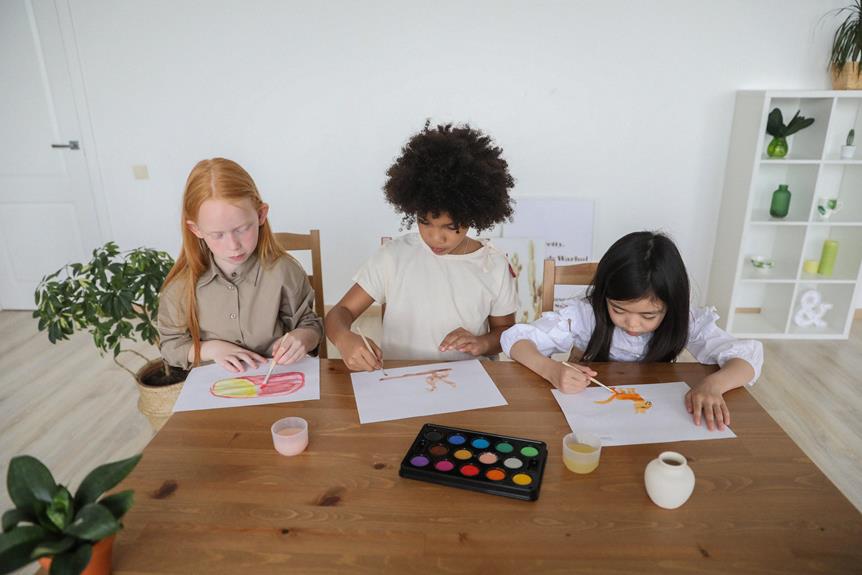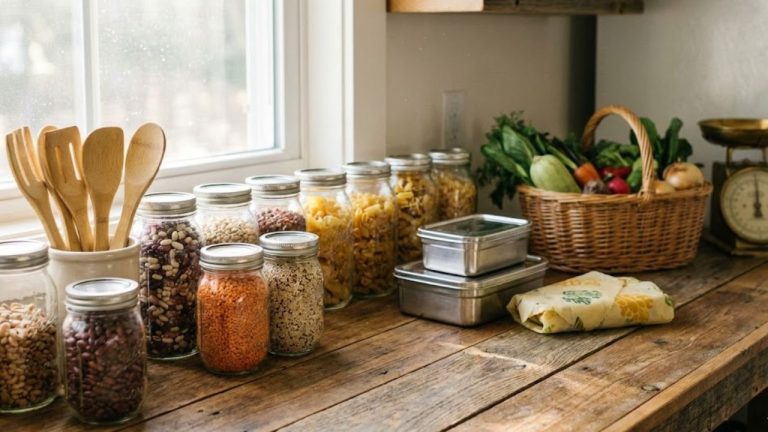Coincidentally, we have stumbled upon the ’12 Essential Educational Tools for a Sustainable Lifestyle’, a treasure trove of resources and strategies that will help us embark on a journey towards a more sustainable existence.
These tools are designed to foster a sense of belonging and empower us to make a positive impact on our planet. From engaging on social media platforms to sharing informative content, to exploring eco-friendly apps and websites, we have a multitude of avenues to expand our knowledge and inspire others.
By embracing these educational tools, we can acquire the skills and understanding needed to make eco-conscious choices and contribute to a more sustainable future.
Let’s dive in and discover the limitless possibilities that await us on this sustainable path!
Sustainable Living Workshops
To further explore the benefits and implementation of sustainable living workshops, it’s essential that we delve into their practical applications and outcomes.
Sustainable living workshops provide a valuable platform for Education for Sustainable Development, empowering individuals to make informed lifestyle choices that contribute to sustainable development throughout their lives. These workshops focus on behavior change, equipping participants with the knowledge and skills needed to adopt sustainable practices in their daily lives.
By engaging in hands-on activities like planting vegetable gardens and waste management projects, participants not only learn about sustainable living principles but also experience the positive impact of their actions firsthand.
Sustainable living workshops foster a sense of belonging and community, as individuals come together to learn and work towards a common goal of creating a more sustainable future.
Through these workshops, we can inspire and empower individuals to make lasting changes that contribute to a healthier planet and a more sustainable way of life.
Online Sustainability Courses
Looking to expand your knowledge on sustainability? Look no further than online sustainability courses.
These top-rated courses make sustainable learning easy and accessible, allowing you to gain valuable knowledge and skills from the comfort of your own home.
Whether you’re interested in renewable energy, sustainable agriculture, or eco-friendly design, there’s a course out there that can help you take action towards a more sustainable lifestyle.
Top-Rated Online Courses
The availability of top-rated online sustainability courses offers us a valuable educational resource for cultivating a sustainable lifestyle. These courses provide students with the knowledge and skills necessary to understand and address sustainability challenges in their personal lives and communities.
Here are three reasons why these online courses are essential for promoting sustainability:
- Accessibility: Online resources allow individuals from all walks of life to access quality education on sustainability. With just an internet connection, students can learn at their own pace and convenience, breaking down barriers to education.
- Flexibility: Online courses provide flexibility for busy individuals to balance their studies with work and other commitments. This allows learners to integrate sustainability education seamlessly into their lives, making it more likely to be sustained in the long run.
- Alignment with educational policies: Many educational policies now emphasize the importance of sustainability education. Online sustainability courses align with these policies, providing students with the opportunity to stay up to date with the latest knowledge and practices in sustainability.
Sustainable Learning Made Easy
We can easily incorporate sustainable learning into our lives through online sustainability courses. These courses offer a convenient and accessible way to gain knowledge and skills related to sustainable lifestyles and development.
By enrolling in these courses, we can learn about responsible consumption, understand the environmental impact of our choices, and work towards improving the quality of life for ourselves and future generations.
Online sustainability courses provide a platform for us to engage with like-minded individuals and form communities that are dedicated to creating a more sustainable world. Through interactive modules, discussions, and practical assignments, we can gain a deeper understanding of sustainable development and how to apply it in our daily lives.
Eco-friendly Apps and Websites
Our search for eco-friendly apps and websites led us to discover a multitude of useful and innovative tools for sustainable living. These platforms provide practical solutions to reduce our ecological footprint and incorporate sustainability initiatives into our daily lives.
Here are three standout apps and websites that caught our attention:
- Waste Management Apps: These apps help us manage our waste more efficiently by providing information on recycling centers, collection schedules, and proper disposal methods. They also offer tips on reducing waste and reusing materials, empowering us to make conscious choices and contribute to a cleaner environment.
- School Garden Websites: School garden websites connect students and educators with resources and lesson plans to create and maintain school gardens. These platforms promote hands-on learning, foster a deeper understanding of sustainable agriculture, and encourage healthy eating habits.
- Carbon Footprint Calculators: Carbon footprint calculators track our individual impact on the environment by measuring our greenhouse gas emissions. By inputting data on our daily activities such as transportation, energy consumption, and food choices, these tools provide insights and recommendations for reducing our carbon footprint.
With these eco-friendly apps and websites at our fingertips, we can easily integrate sustainable practices into our daily routines and contribute to a healthier planet.
Sustainable Lifestyle Blogs
To delve into the world of sustainable lifestyle blogs, let’s explore the valuable insights and resources they offer for adopting eco-friendly practices.
Sustainable lifestyle blogs provide a wealth of information on sustainability initiatives and best practices. They offer practical tips and ideas for reducing waste, conserving energy, and making eco-friendly choices in our daily lives.
These blogs are a great resource for students looking to engage in sustainable living and prepare themselves for a future that prioritizes environmental responsibility. By following sustainable lifestyle blogs, students can learn about the latest trends and innovations in sustainability, discover local organizations and businesses that are actively working towards sustainability, and gain inspiration to take action in their own lives.
These blogs foster a sense of belonging and community among like-minded individuals who are passionate about creating a more sustainable world. So, let’s join the sustainable lifestyle blogosphere and start making a positive impact today!
Green Building and Architecture Resources
Let’s explore the world of green building and architecture resources, where innovative eco-friendly designs and energy-efficient construction methods are at the forefront.
These tools and resources provide valuable insights and techniques for creating sustainable spaces that minimize environmental impact while maximizing energy efficiency.
Innovative Eco-Friendly Designs
Innovative eco-friendly designs in green building and architecture offer sustainable solutions for a more environmentally conscious future. These designs not only reduce the negative impact on the environment but also provide a healthier and more comfortable living and working environment for individuals.
Here are three examples of innovative eco-friendly designs that can contribute to a sustainable lifestyle:
- Green roofs: These roofs are covered with vegetation, which helps to reduce energy consumption by providing natural insulation and reducing the urban heat island effect. They also absorb rainwater, reducing stormwater runoff and improving air quality.
- Passive solar design: This design utilizes the sun’s energy to heat and cool buildings, reducing the need for artificial heating and cooling systems. It incorporates features such as large windows, thermal mass, and shading devices to maximize natural light and heat.
- Recycled building materials: Using recycled materials in construction reduces the demand for new resources and minimizes waste. Materials like reclaimed wood, recycled glass, and recycled steel can be incorporated into buildings, giving them a unique and sustainable aesthetic.
Energy-Efficient Construction Methods
For our sustainable lifestyle, we rely on energy-efficient construction methods and utilize green building and architecture resources. These methods play a crucial role in sustainable development and combating climate change.
By incorporating energy-efficient techniques into the construction process, we can reduce the amount of energy consumed by buildings, thereby minimizing our carbon footprint.
Educational tools that focus on energy-efficient construction methods are essential for promoting sustainable practices in the industry. They provide individuals with the knowledge and skills needed to design and construct buildings that are environmentally friendly and energy-efficient.
From using renewable materials to implementing passive design strategies, these resources offer practical solutions to reduce energy consumption and promote sustainable development.
Sustainable Fashion Resources
We often overlook the impact of our fashion choices on the environment and society. However, by embracing sustainable fashion resources, we can make a positive difference in our lives and the world around us.
Here are three educational tools that can help us transition to a more sustainable lifestyle:
- Fashion Revolution: This global movement educates consumers about the environmental impacts of the fashion industry and promotes transparency and ethical practices. Through campaigns like ‘Who Made My Clothes?’ and resources such as the Fashion Revolution fanzine, we can learn about the social and environmental consequences of our consumption and production choices.
- Good On You: This app provides ratings and information on the sustainability practices of various fashion brands. By using Good On You, we can make informed decisions when purchasing clothing and support brands that prioritize ethical and sustainable practices.
- Sustainable Fashion Academy: This online platform offers courses and resources to educate individuals about sustainable fashion. From understanding the lifecycle of clothing to learning about sustainable materials and production techniques, the Sustainable Fashion Academy equips us with knowledge to make more conscious choices.
Renewable Energy Education
One valuable resource for learning about renewable energy is an online platform that offers interactive courses and informative resources. This platform provides a comprehensive understanding of renewable energy technologies, such as solar, wind, hydro, and geothermal power. Through engaging videos, interactive quizzes, and real-life case studies, users can explore the benefits of renewable energy and its potential for a sustainable lifestyle.
By educating ourselves about renewable energy, we can contribute to a more sustainable future for ourselves and future generations. Renewable energy education equips us with the knowledge and skills to make informed choices and take action towards a greener and cleaner world. It empowers us to advocate for renewable energy policies, support renewable energy projects in our communities, and reduce our carbon footprint.
With the help of educational tools like this online platform, we can become active participants in the transition to a sustainable energy future. Let’s embrace renewable energy education as a crucial step towards achieving a sustainable lifestyle and ensuring a brighter future for all.
Composting and Organic Gardening Guides
Our school’s comprehensive composting and organic gardening guide provides students with the tools and knowledge necessary to cultivate a sustainable lifestyle. Here are three ways our guide can help you make a positive change for the environment:
- Learn the art of composting: Our guide will teach you how to turn your kitchen scraps and yard waste into nutrient-rich compost. By composting, you can reduce waste, enrich the soil, and minimize the need for chemical fertilizers.
- Start your organic garden: With our guide, you’ll discover the joys of growing your own food without harmful pesticides and synthetic fertilizers. You’ll learn how to choose the right plants, create healthy soil, and maintain a thriving garden that supports biodiversity.
- Share your journey on social media: Document your composting and gardening adventures on social media to inspire others and create a community of like-minded individuals. By sharing your sustainable practices, you can encourage future generations to prioritize environmental sustainability and work towards a more sustainable future.
Join us in embracing composting and organic gardening as essential tools for a sustainable future!
Recycling and Waste Reduction Resources
Incorporating recycling and waste reduction practices into our daily lives is crucial for cultivating a sustainable lifestyle. By actively participating in these practices, we can contribute to the preservation of our environment and the conservation of our resources.
Fortunately, there are numerous educational tools and resources available to help us on this journey towards sustainability. From recycling guides to waste reduction strategies, these resources provide us with the knowledge and practical skills to make a positive impact.
Online platforms, such as websites and mobile apps, offer step-by-step instructions, tips, and interactive tools to help us properly recycle and reduce waste. Additionally, local community centers and environmental organizations often hold workshops and events to educate and engage individuals in waste reduction efforts.
Environmental Science and Ecology Textbooks
The use of environmental science and ecology textbooks is essential for fostering a sustainable lifestyle. These textbooks provide valuable knowledge and resources that empower individuals to make informed decisions regarding sustainability.
Here are three reasons why environmental science and ecology textbooks are crucial educational tools:
- Comprehensive understanding: These textbooks offer a comprehensive understanding of sustainability, environmental science, and ecology. They cover topics such as biodiversity, climate change, and resource management, equipping students with the knowledge necessary to address pressing environmental issues.
- Practical application: Environmental science and ecology textbooks provide practical examples and case studies that demonstrate how sustainability principles can be applied in real-life situations. This allows students to see the direct impact of their actions on the environment and encourages them to make sustainable choices.
- Critical thinking skills: By studying environmental science and ecology, students develop critical thinking skills. They learn to analyze complex environmental problems, evaluate different perspectives, and propose innovative solutions. These skills are essential for addressing sustainability challenges and creating a more environmentally conscious society.
Incorporating environmental science and ecology textbooks into education equips individuals with the knowledge and skills needed to live a sustainable lifestyle and contribute to a healthier planet.
Sustainable Food and Nutrition Education
To continue our exploration of educational tools for a sustainable lifestyle, let’s delve into the importance of sustainable food and nutrition education.
Sustainable food and nutrition education plays a crucial role in promoting responsible consumption and production, aligning with SDG 12. By teaching about sustainable food practices, we can empower individuals to make informed choices that benefit both their health and the planet.
Education tools such as school gardens and incorporating local edible plants into meals can provide hands-on experiences and foster a deeper understanding of the connection between food and the environment.
Moreover, sustainable food and nutrition education can contribute to building a sustainable economy by promoting local agriculture and supporting community food systems.
Community Engagement and Advocacy Tools
As we continue our exploration of sustainable food and nutrition education, let’s now turn our attention to the community’s role in promoting a sustainable lifestyle through engagement and advocacy tools.
Social Media Platforms: Utilizing platforms like Instagram, Facebook, and Twitter is a powerful way to share informative content on sustainability. We can encourage conversations about sustainable lifestyle choices and foster a sense of community around sustainability.
Blogs and Websites: Dedicated platforms that provide tips for reducing waste, improving energy efficiency, and making eco-friendly improvements are invaluable. These platforms can incorporate interactive elements to engage readers and create a space for sharing experiences and ideas.
Awareness Campaigns and Workshops: Organizing workshops or seminars with sustainability experts can engage communities in conversations about making sustainable changes. Creating awareness campaigns can inspire small changes, such as using reusable grocery bags or public transportation.
Conclusion
In conclusion, utilizing the 12 essential educational tools for a sustainable lifestyle can have a significant impact on our planet.
Did you know that by recycling just one aluminum can, you can save enough energy to power a TV for three hours?
By incorporating these tools into our daily lives, we can make a difference and contribute to a more sustainable future.
So let’s take action, educate ourselves, and inspire others to join the movement towards a greener and healthier world.




